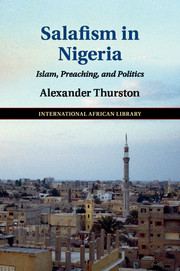Book contents
- Frontmatter
- Contents
- Acknowledgments
- List of Maps
- Introduction: Defining Salafism, Analyzing Canons
- Part I Salafism and Its Transmission
- 1 The Canon and Its Canonizers
- 2 Africans and Saudi Arabia
- 3 Nigerians in Medina
- Part II The Canon in Action
- Part III Boko Haram and the Canon
- Conclusion
- Appendix 1 The Sermon of Necessity (Khuṭbat al-Ḥāja)
- Glossary of Persons
- Glossary of Arabic Terms
- Bibliography
- Index
- Miscellaneous Endmatter
3 - Nigerians in Medina
from Part I - Salafism and Its Transmission
Published online by Cambridge University Press: 05 September 2016
- Frontmatter
- Contents
- Acknowledgments
- List of Maps
- Introduction: Defining Salafism, Analyzing Canons
- Part I Salafism and Its Transmission
- 1 The Canon and Its Canonizers
- 2 Africans and Saudi Arabia
- 3 Nigerians in Medina
- Part II The Canon in Action
- Part III Boko Haram and the Canon
- Conclusion
- Appendix 1 The Sermon of Necessity (Khuṭbat al-Ḥāja)
- Glossary of Persons
- Glossary of Arabic Terms
- Bibliography
- Index
- Miscellaneous Endmatter
Summary
How did Salafism emerge in northern Nigeria? What role did the Islamic University of Medina play in this process? How, and for whom, did the Salafi canon become a standard of reference in northern Nigeria?
The previous chapter discussed the Nigerian Shaykh Abubakar Gumi (1924–92) and the anti-Sufi movement he patronized, Izala. I noted that Gumi, despite his decades-long contact with Saudi Arabia, remained an anti-Sufi Mālikī who was more attuned to local political and religious conflicts than to the intellectual flows of global Salafism. Gumi and most of Izala's early leaders had limited engagement with the Salafi canon.
The wide spread of what might be called “full” Salafism in northern Nigeria – a kind of Salafism infused with references to the canon, and attuned not only to anti-Sufism but also to anti-madhhabism – began with graduates of the Islamic University of Medina who returned home in the 1990s and 2000s. Figures like Shaykh Jaʿfar Maḥmūd Ādam started their careers as preachers in Izala and remained associated with Izala throughout their lives. At the Islamic University of Medina, however, Ādam and his circle had deep exposure to the Salafi canon. This exposure led them to embrace a new self-identification that emphasized global and transhistorical Salafi affiliations.
This chapter argues that the canon provided the central mechanism through which Ādam and his circle distinguished their Salafism from Izala's anti-Sufism, although in practice, dividing lines between the two groups remain blurry. The graduates of Medina learned this canon primarily at the Islamic University, which sought to define a Salafi creed and teach techniques for transmitting it. Defining the creed involved refuting a large catalogue of rivals – not just Sufis, but the Shīʿa, the Ashʿarī theological school, and others. The university's students also received teachings that rejected affiliation to any legal school. Students in Medina engaged a Salafi canon whose contents could be deployed to challenge not only Sufis but also the anti-Sufi reformists in Izala.
The graduates of Medina differentiated themselves from Izala in several ways. First, they considered canonical figures like Ibn Taymiyya, as well as the canonical authorities of contemporary Salafism – Shaykhs Muḥammad Nāṣir al-Dīn al-Albānī, ʿAbd al-ʿAzīz ibn Bāz, and Muḥammad ibn Ṣāliḥ al-ʿUthaymīn – to be their preeminent intellectual guides, rather than Gumi.
- Type
- Chapter
- Information
- Salafism in NigeriaIslam, Preaching, and Politics, pp. 92 - 114Publisher: Cambridge University PressPrint publication year: 2016



